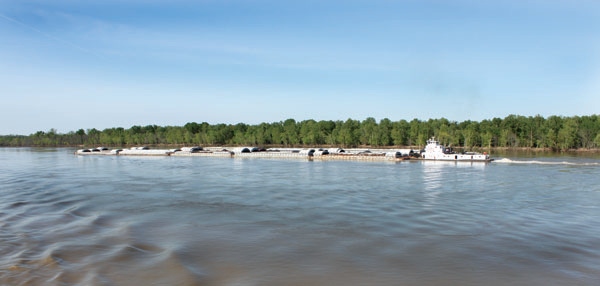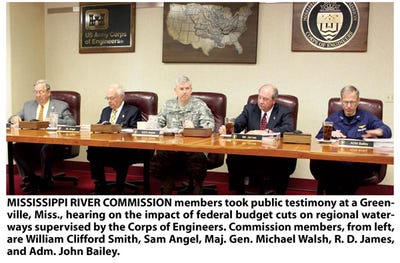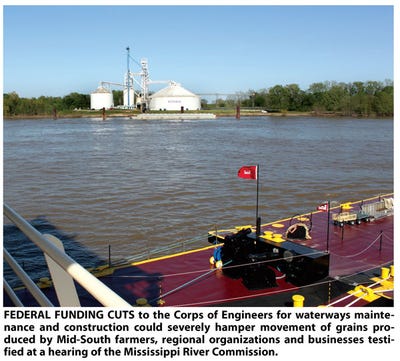
Mid-South agriculture could be adversely affected by federal budget cuts that would reduce funding for maintenance and improvements to the rivers, streams, and lakes under control of the U.S. Corps of Engineers in the Mississippi River Valley. Whether it’s grain moving through river terminals to export, or gasoline/diesel coming in, or thousands of products that rely on the waterway system for efficient transport of bulk goods, the impact could be far-reaching and more costly, members of the Mississippi River Commission were told at a Greenville, Miss. hearing.
April 20, 2011

Mid-South agriculture could be adversely affected by federal budget cuts that would reduce funding for maintenance and improvements to the rivers, streams, and lakes under control of the U.S. Corps of Engineers in the Mississippi River Valley.
Whether it’s grain moving through river terminals to export, or gasoline/diesel coming in, or thousands of products that rely on the waterway system for efficient transport of bulk goods, the impact could be far-reaching and more costly, members of the Mississippi River Commission were told at a Greenville, Miss. hearing.
Beyond that, water areas that are heavily dependent on tourism and recreation dollars would also feel the pinch as funds for staffing and maintenance continue to ebb.
 From a 2010 appropriation of $230 million, the 2011 fiscal year budget dropped to $136 million and the preliminary budget for fiscal year 2012 is projected at $121 million.
From a 2010 appropriation of $230 million, the 2011 fiscal year budget dropped to $136 million and the preliminary budget for fiscal year 2012 is projected at $121 million.
“There will have to be compromises in what we can do,” said Col. Jeff Eckstein, district commander of the Corps’ Vicksburg, Miss., district. “The impact of these cuts will be felt across the board.”
 Money for dredging “is pretty much not in the budget,” he said. There is “some money” to continue survey work, and there would be only enough funding to add “perhaps an item per year” of levee construction projects. The 17 Delta headwaters projects now under way would be completed, but no more design work would be ongoing.
Money for dredging “is pretty much not in the budget,” he said. There is “some money” to continue survey work, and there would be only enough funding to add “perhaps an item per year” of levee construction projects. The 17 Delta headwaters projects now under way would be completed, but no more design work would be ongoing.
At this point, Eckstein said, “there is no money” in the 2012 budget for the Upper Yazoo project. A Big Sunflower River project will be completed this year, “but there is no money in the 2012 budget for additional work.”
Representatives from numerous organizations and businesses told the commission panel that cutbacks in Corps services would be a significant economic detriment to the region.
“The Mississippi River system is the nation’s marine highway,” said Tommy Hart, director of the Port of Greenville. “More than two-thirds of the nation’s grains and oilseed products are shipped on these waterways.
“Its continued maintenance and improvement are vital to our competitiveness and our security. This is one of the wisest uses of taxpayer dollars; it’s an investment that is repaid many times over.”
In the last two years, Hart said, there has been “a dramatic increase” in tonnage going through the Greenville port, “largely due to increased shipments of grains and steel.
National, international impact
“We understand that cuts have to be made in federal spending, but we hope Congress will do so with a comprehension of the national and international impact if this river system is allowed to decline.”
Bill Hobgood, executive director of the Ouachita River Valley Association, noted that 28,000 jobs in southeast Arkansas and northeast Louisiana are associated with the 520-mile river, the longest in the Vicksburg District.
Eliminating dredging would severely hamper navigation and shipping, he said, and would have an adverse impact on flood control, water supplies for agriculture and municipalities, recreation/tourism, fish/wildlife, and ecosystem restoration.
The system has been dredged for the past 40 years, Hobgood noted, and “minimal dredging is needed annually to maintain the channel.” Bank stabilization work is also needed, he said, to maintain the integrity of the levees, but no funds were appropriated for levee work in 2010 or 2011.
 “We move 1.7 million tons of commodities a year on this river,” he said. “These systems need to be dependable and reliable. It’s critical that the Corps get the money needed for dredging and other maintenance on this waterway.”
“We move 1.7 million tons of commodities a year on this river,” he said. “These systems need to be dependable and reliable. It’s critical that the Corps get the money needed for dredging and other maintenance on this waterway.”
Without needed dredging, Hobgood said, the channel could become unusable for shipping and eventually, “there could be places you could walk across the river.”
Bill Williams, Mississippi/Louisiana operations manager for Bunge North America at Vicksburg, Miss., said the Ouachita/Black River system serves large areas of central and north Louisiana. During the grains harvest period, he said, “our tanks can fill quickly, and if we don’t have a way to move this production, it can adversely affect everyone.
“Even with the increase in cotton prices, we’ve got hundreds of thousands of acres of land that was once cotton now in grains. And growers are getting higher yields. Southern farmers are very aggressive harvesters, and a lot of grain comes off in a very short time period. There’s no way we could truck grain out as fast as farmers can truck it in.
“Virtually all that grain ends up on a barge,” Williams said. “If we have to light load barges because the depth of these waterways isn’t adequate, it could stop the whole process and have a big impact on the price structure of grains. Everyone would feel the impact.
R.D. James, manager of A.C. Riley Cotton Company LLC at New Madrid, Mo., and a member of the Mississippi River Commission, noted that “with more than 60 percent of the grain in the country moved on these rivers, I don’t know what would happen to our economy if we can’t get this grain out for export.
Economy would be devastated
“There aren’t enough trucks in the U.S. to handle that kind of volume," James said. "The economy of the entire Mississippi River Valley would be devastated and the economy of the nation would be impacted.
“If we have to light load barges, the basis on grains will go up and that will be passed on to the farmer. It will be money right out of the farmer’s pocket. The average person just doesn’t realize how important this waterway infrastructure is.”
Richard Brontoli, executive director of the four-state Red River Valley Association, Shreveport, La., said “We are rallying our industries to inform Congress of the issues involved with this vital transportation system.
“If we can’t dredge and maintain these waterways, we’re going to see additional costs throughout the system. If we lose this transportation system and are forced to go to alternate methods, thousands of jobs will be jeopardized and our economy will be adversely affected.
 “If waterways are closed companies will not relocate to other parts of the country — they will move overseas,” Brontoli said. ‘If we don’t invest now, there will be a negative impact on our ability to compete in the world market, threatening our national security.”
“If waterways are closed companies will not relocate to other parts of the country — they will move overseas,” Brontoli said. ‘If we don’t invest now, there will be a negative impact on our ability to compete in the world market, threatening our national security.”
Globalization “has harmed us tremendously,” said Frank Hash, mayor, El Dorado, Ark. “We’ve lost a lot of light and medium industries.”
He said El Dorado approved taxes to build an $18 million conference center “to capitalize on what this area offers in wildlife and recreation. We’re unique, and we’ve got skin in the game. These waterway systems are vital to our future.”
Cindy Smith, Arkansas Department of Parks and Tourism, noted that “our region’s water systems are also important to tourism.
“As towns have gotten smaller and agriculture has become larger, tourism and agritourism have become important to the rural economy. We depend on these precious water resources, and we urge you to keep tourism in the forefront of what you do.”
“My country and my government are broke,” said Dolly Marascalco, Grenada Lake Development Commission, Grenada, Miss.
“With all these budget cuts, the progress and improvements that have been made at the large Mississippi flood control lakes are at risk. We have thousands of visitors yearly at Grenada Lake for recreation and special events and we’re worried. How do we keep all this maintained for the public? Where do we go from here?”
Janie Mortimer, executive director of the Tate County, Miss., Development Association, noted that Arkabutla, the northernmost of the Mississippi flood control lakes, generates a $33 million yearly economic impact from tourism and recreation.
“These budget cuts will mean a reduction in vital services and perhaps partial closures of campgrounds and facilities,” she said.
You May Also Like



